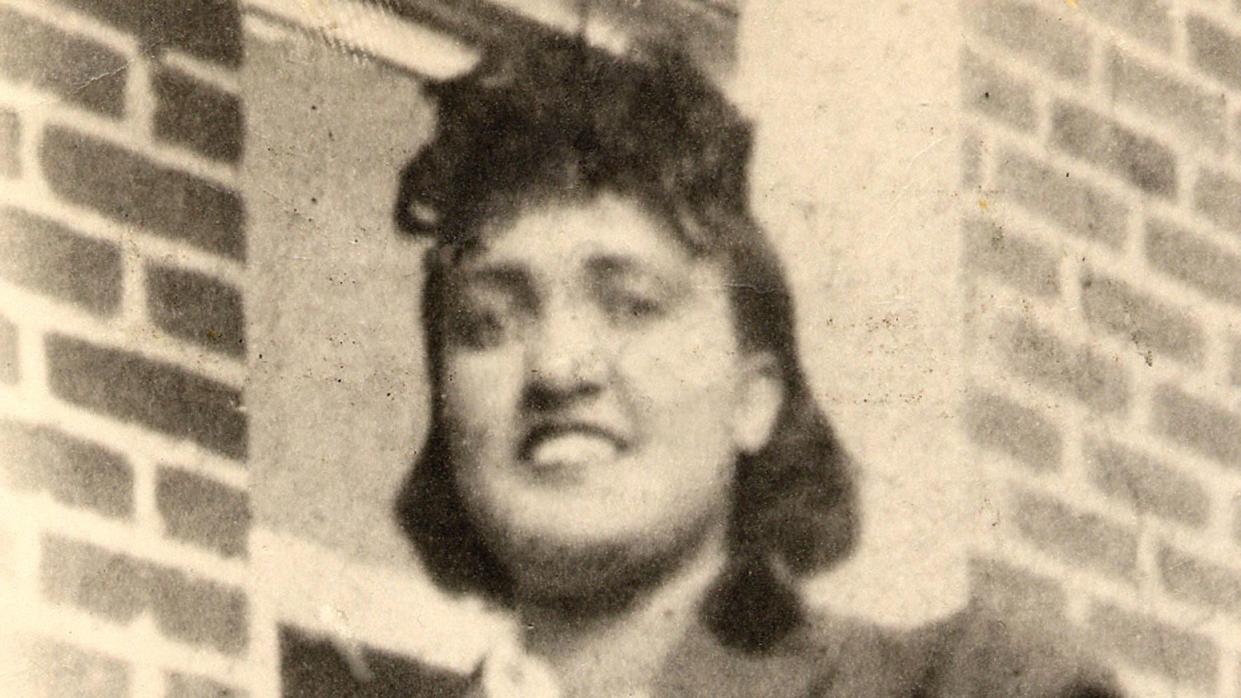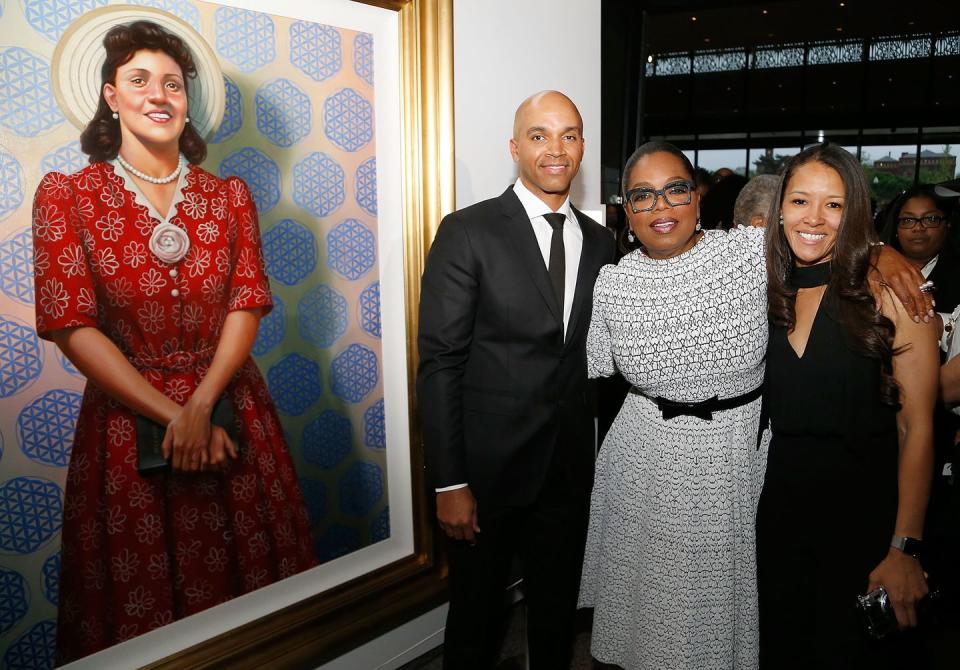Henrietta Lacks: Biography, Cervical Cancer Patient, HeLa Cells

- Oops!Something went wrong.Please try again later.
"Hearst Magazines and Yahoo may earn commission or revenue on some items through these links."
[table-of-contents] stripped
1920-1951
Latest News: Family of Henrietta Lacks Settles Suit Over Harvested Cells
On August 1, the estate of Henrietta Lacks settled its lawsuit against a Massachusetts biotech company. In a 2021 compliant, Lacks’ family accused Thermo Fisher Scientific Inc. of profiting from the HeLa cell line, named after the Black mother of five whose tissue was harvested without her knowledge or consent while she was being treated for cervical cancer. The terms of the settlement are confidential.
Who Was Henrietta Lacks?
Born in 1920, Henrietta Lacks was a Black woman who died of cervical cancer in 1951. Cells taken from her body without her knowledge were used to form the HeLa cell line, which has been used extensively in medical research since that time. Lacks’ case has sparked legal and ethical debates over the rights of an individual to his or her genetic material and tissue. Her story inspired a best-selling book titled The Immortal Life of Henrietta Lacks, which was adapted into a movie starring Oprah Winfrey.
Quick Facts
FULL NAME: Henrietta Lacks (nee Loretta Pleasant)
BORN: August 1, 1920
DIED: October 4, 1951
BIRTHPLACE: Roanoke, Virginia
SPOUSE: David “Day” Lacks (1941-1951)
CHILDREN: Lawrence, Elsie, David Jr., Deborah, and Joe
ASTROLOGICAL SIGN: Leo
Early Life, Husband, and Children
Henrietta Lacks was born Loretta Pleasant on August 1, 1920, in Roanoke, Virginia. At some point, she changed her name to Henrietta. After the death of her mother in 1924, Henrietta was sent to live with her grandfather in a log cabin that had been the slave quarters of a white ancestor’s plantation. Henrietta shared a room with her first cousin David “Day” Lacks.
In 1935, the cousins had a son they called Lawrence. Henrietta was 14 at the time. The couple had a daughter, Elsie, in 1939 and married in 1941. Henrietta and David moved to Maryland at the urging of another cousin Fred Garret. There, they had three more children: David Jr., Deborah, and Joe. They placed their daughter Elsie, who was developmentally disabled, in the Hospital for the Negro Insane.
Cancer Diagnosis and Death
On February 1, 1951, Lacks went to Johns Hopkins Hospital after experiencing abnormal pain and bleeding in her abdomen. Physician Howard Jones quickly diagnosed her with cervical cancer.
During her subsequent radiation treatments, doctors removed two cervical samples from Lacks without her knowledge. She continued to experience severe pain and returned to the hospital on August 8, remaining there until her death weeks later.
She died at Johns Hopkins on October 4, 1951, at the age of 31. A partial autopsy revealed the cancer had metastasized throughout her body.
Lacks was buried at an unmarked grave in her childhood home of Clover, Virginia. Her son David noted how rain poured from the sky, as if heaven was weeping for his mother.
HeLa Cells
The cells from Lacks’ tumor made their way to the laboratory of researcher Dr. George Otto Gey. Gey noticed an unusual quality in the cells. Unlike most cells, which survived only a few days, Lacks’ cells were far more durable.
Gey isolated and multiplied a specific cell, creating a cell line. He dubbed the resulting sample HeLa, derived from the name Henrietta Lacks.
The HeLa strain revolutionized medical research. Jonas Salk used the HeLa strain to develop the polio vaccine, sparking mass interest in the cells. As demand grew, scientists cloned the cells in 1955.
Since that time, over 10,000 patents involving HeLa cells have been registered. Researchers have used the cells to study disease and to test human sensitivity to new products and substances. More recently, the cells enabled the development of COVID-19 vaccines.
In February 2010, Johns Hopkins released a statement concerning the cervical samples that were taken from Lacks without her consent:
“Johns Hopkins Medicine sincerely acknowledges the contribution to advances in biomedical research made possible by Henrietta Lacks and HeLa cells. It’s important to note that at the time the cells were taken from Mrs. Lacks’ tissue, the practice of obtaining informed consent from cell or tissue donors was essentially unknown among academic medical centers. Sixty years ago, there was no established practice of seeking permission to take tissue for scientific research purposes. The laboratory that received Mrs. Lacks’s cells had arranged many years earlier to obtain such cells from any patient diagnosed with cervical cancer as a way to learn more about a serious disease that took the lives of so many. Johns Hopkins never patented HeLa cells, nor did it sell them commercially or benefit in a direct financial way. Today, Johns Hopkins and other research-based medical centers consistently obtain consent from those asked to donate tissue or cells for scientific research.”
'The Immortal Life of Henrietta Lacks'
The Lacks family learned about the HeLa cells in the 1970s. In 1973, a scientist contacted family members, seeking blood samples and other genetic materials—but inquiries from the family regarding the use of HeLa cells, and publications that included their own genetic information, were largely ignored.
The case gained new visibility in 1998, when the BBC screened an award-winning documentary on Lacks and HeLa. Rebecca Skloot later wrote a popular book on the subject, called The Immortal Life of Henrietta Lacks.

Oprah Winfrey and HBO announced plans to develop a film based on Skloot’s 2010 book and in 2017, the network aired the biopic. Lacks’ sons David Jr. and Zakariyya Rahman, who changed his name from Joe after converting to Islam), and granddaughter Jeri consulted on the film, and Skloot was a co-executive producer. The film, which starred Winfrey as Lacks’ daughter Deborah and Rose Byrne as Skloot, was nominated for an Emmy Award for Outstanding Television Movie.
Organizations that have profited from HeLa have since publicly recognized Henrietta Lacks’ contributions to research. John Hopkins has committed to naming a new building, scheduled for completion in 2025, after Henrietta. Morgan State University granted Lacks a posthumous honorary degree. In 2010, Dr. Roland Pattillo of Morehouse donated a headstone for Lacks’ unmarked grave. The Lacks family has also been honored at the Smithsonian Institution and the National Foundation for Cancer Research.
Legal and Ethical Implications
The HeLa case has raised questions about the legality of using genetic materials without permission. Neither Lacks nor her family granted permission to harvest her cells, which were then cloned and sold.
The California Supreme Court upheld the right to commercialize discarded tissue in the 1990 case Moore v. Regents of the University of California. In 2013, German researchers published the genome of a strain of HeLa cells without permission from the Lacks family.
The Lacks family had limited success in gaining control of the HeLa strain. In August 2013, an agreement between the family and the National Institutes of Health granted the family acknowledgement in scientific papers and some oversight of the Lacks genome.
Lawsuit and Settlement
In October 2021, Lacks’ estate filed a lawsuit against biotechnology company Thermo Fisher Scientific Inc. based in Waltham, Massachusetts. It accused the company of selling her cells without her knowledge or consent as part of a “racially unjust medical system” and demanded Thermo Fisher give up the full amount of profits obtained by commercializing the HeLa cell line.
The company argued the complaint should be thrown out because the statute of limitations had expired, but lawyers for the Lacks family argued that shouldn’t apply to the case because the company has continued to financially benefit from HeLa cells.
On August 1, 2023—what would have been Henrietta’s 103rd birthday—a lawyer for the Lacks estate said a confidential settlement was reached in the dispute after a full day of closed-door negotiations inside a federal courthouse in Baltimore. “There couldn’t have been a more fitting day for her to have justice, for her family to have relief,” Henrietta’s grandson Alfred Lacks Carter Jr. said. “It was a long fight—over 70 years—and Henrietta Lacks gets her day.”
Fact Check: We strive for accuracy and fairness. If you see something that doesn’t look right, contact us!
..
You Might Also Like

